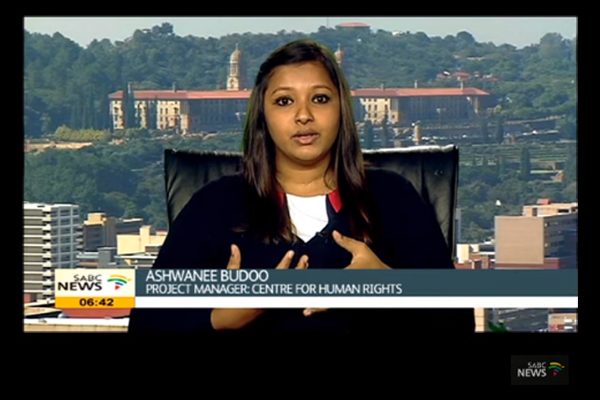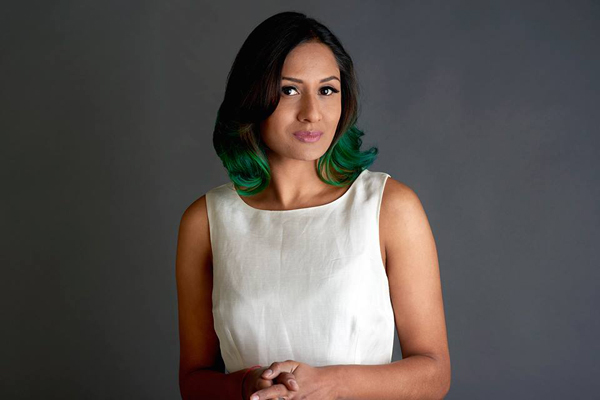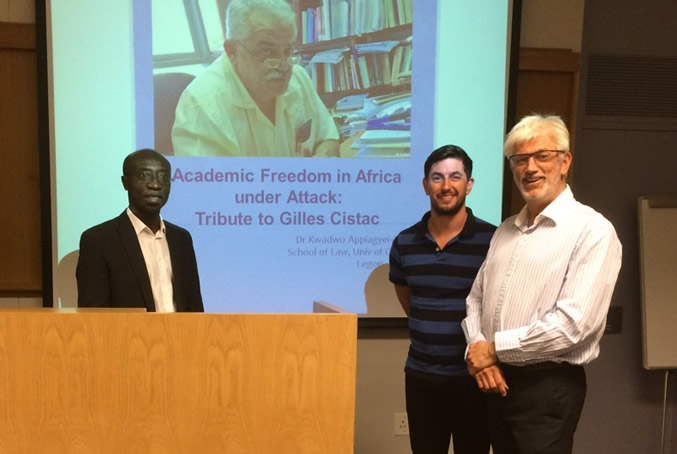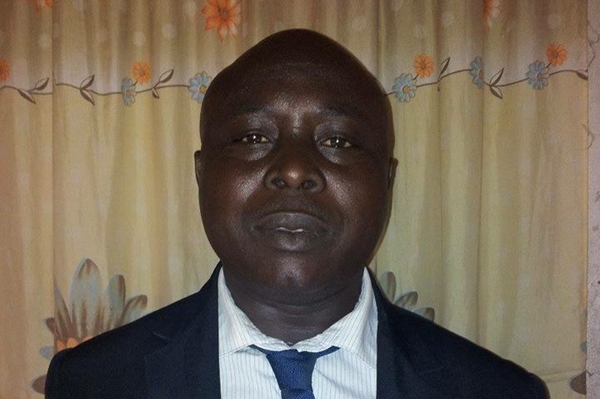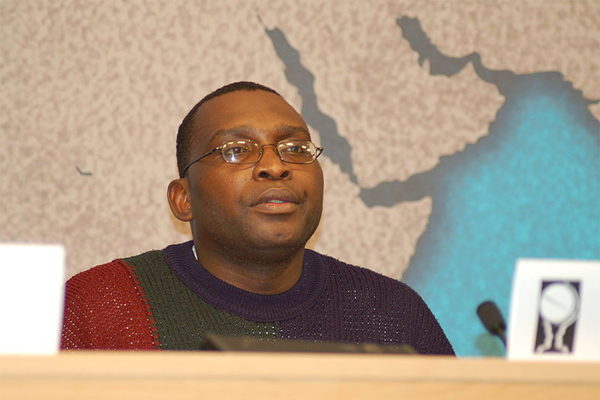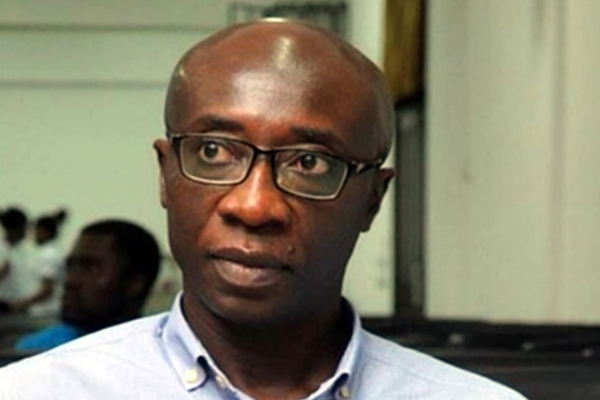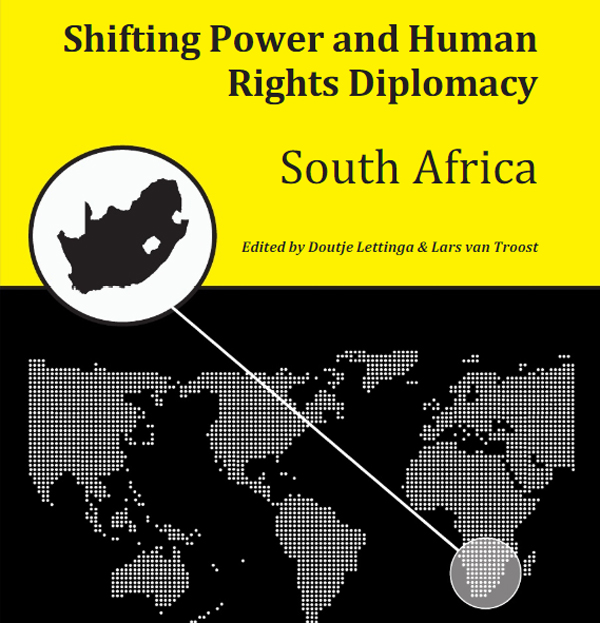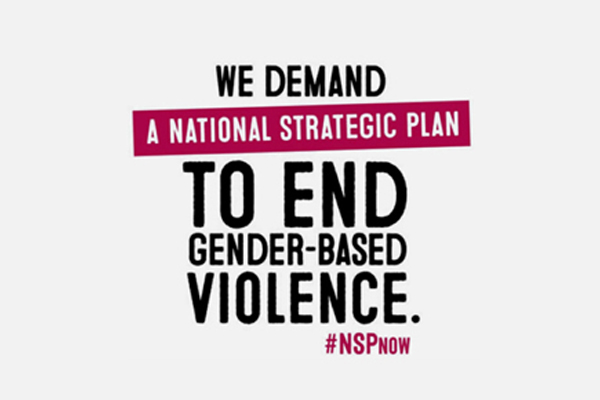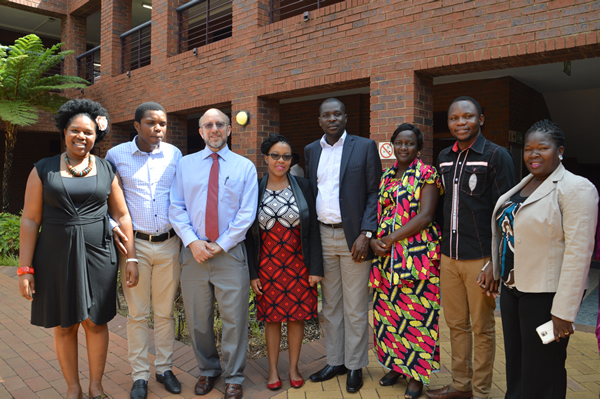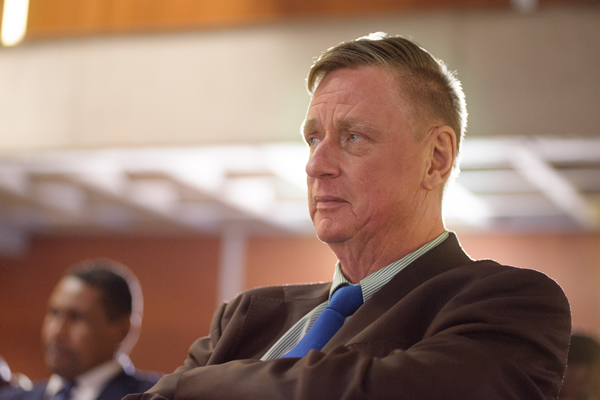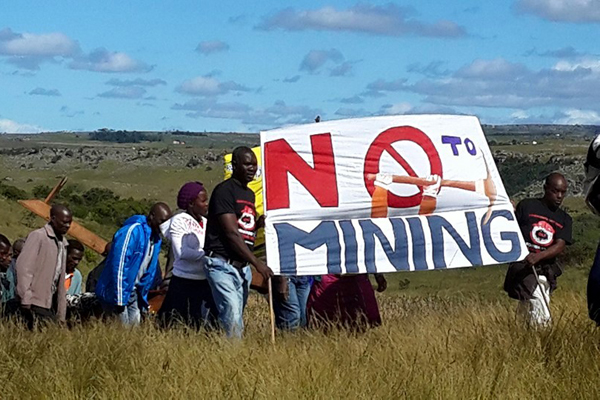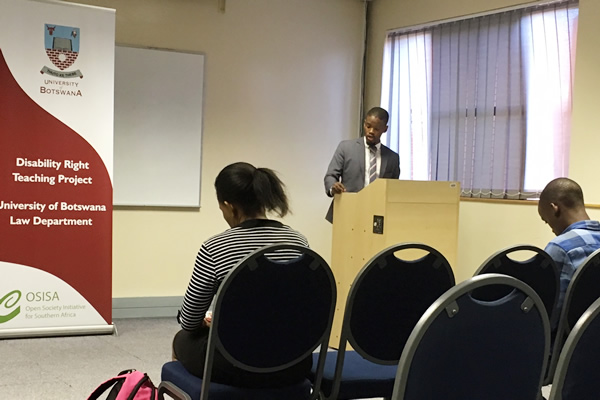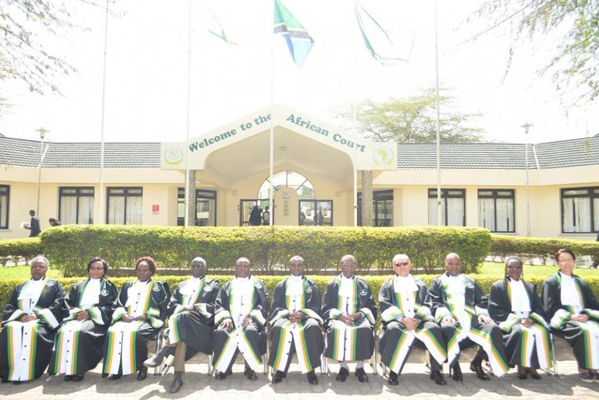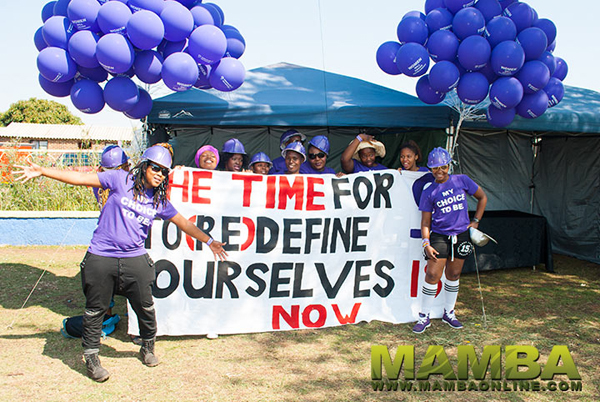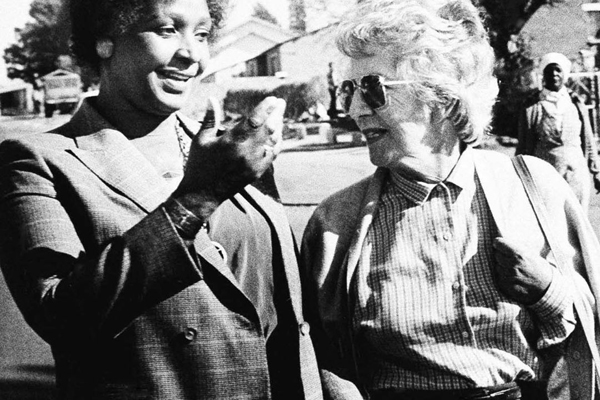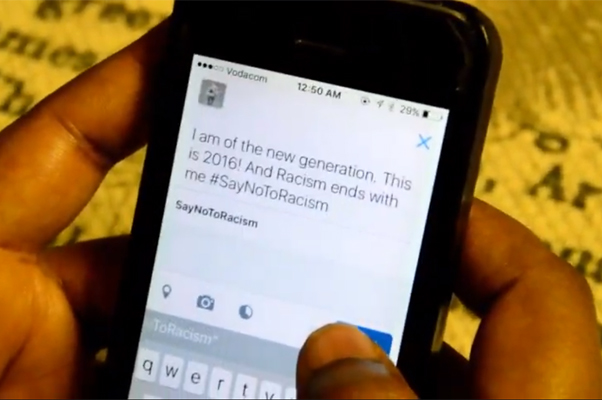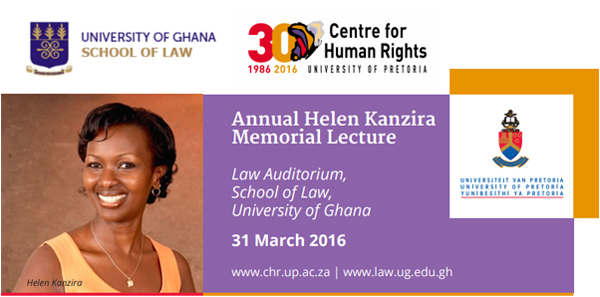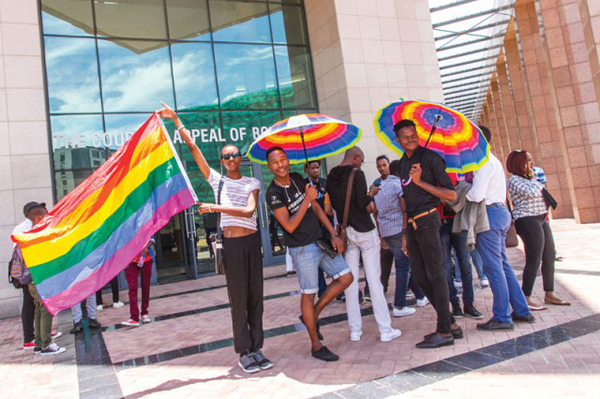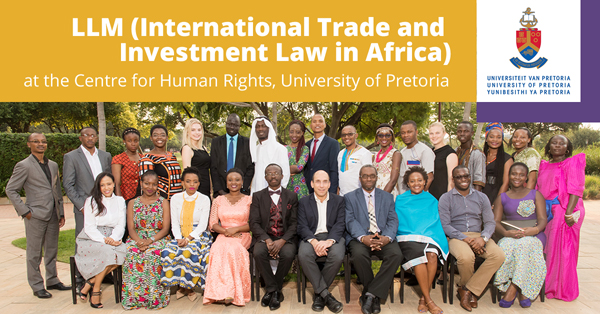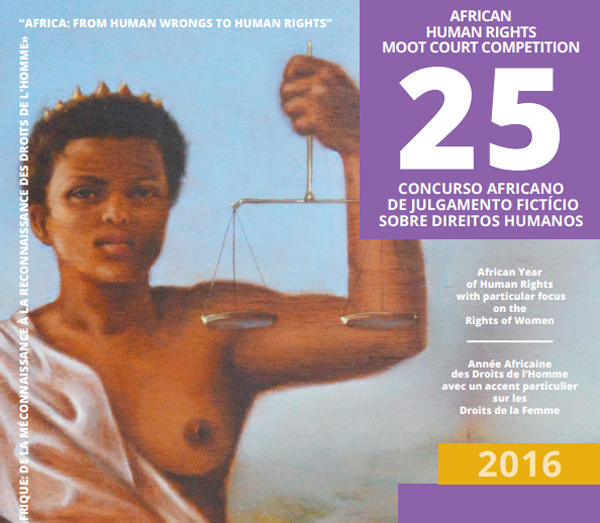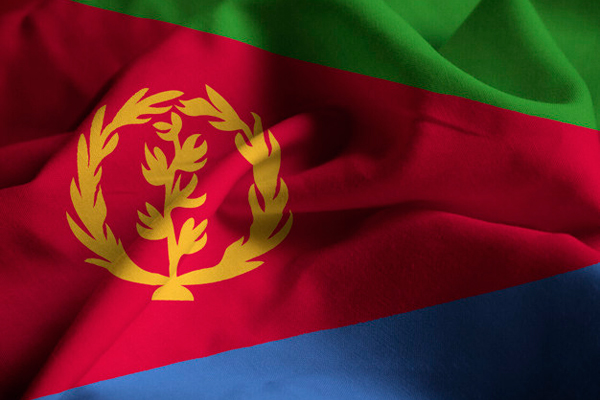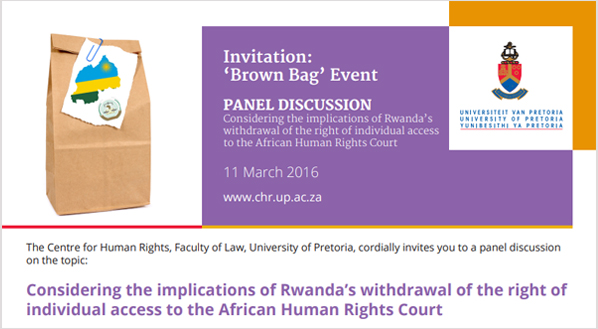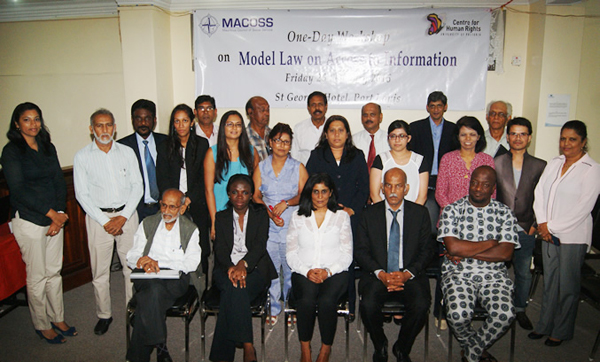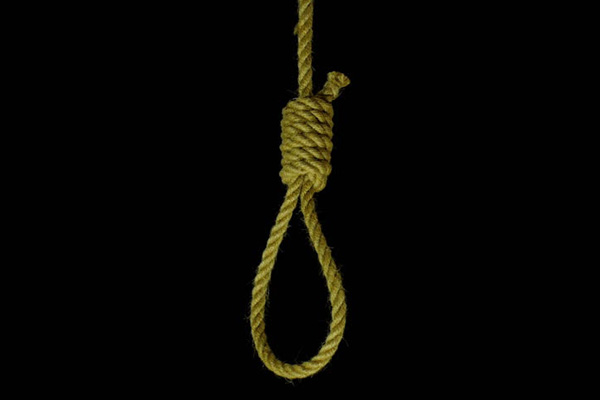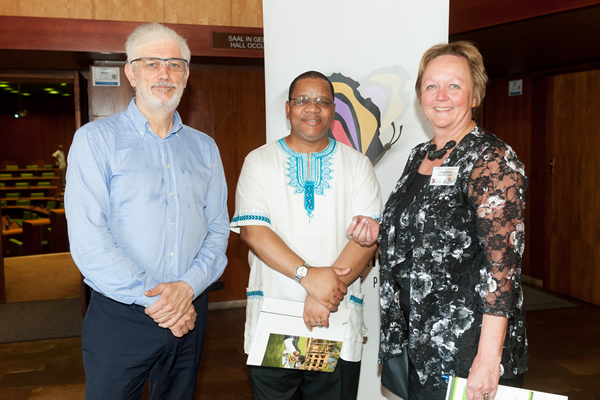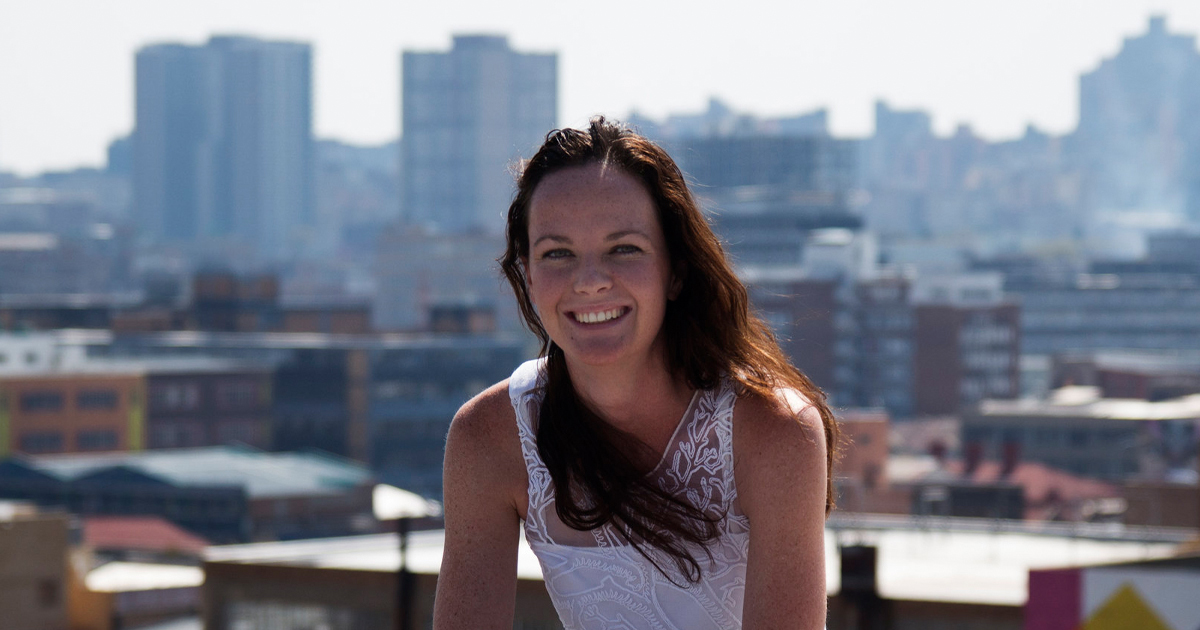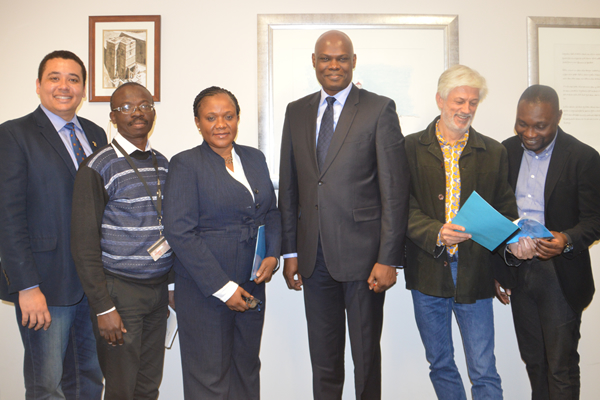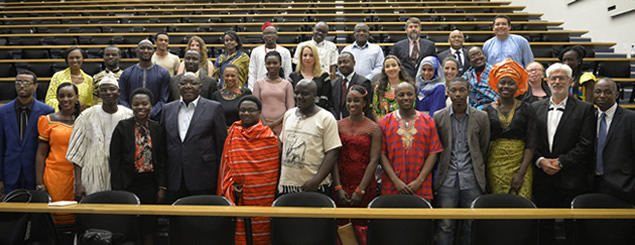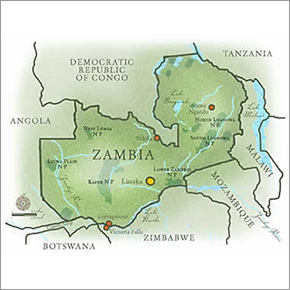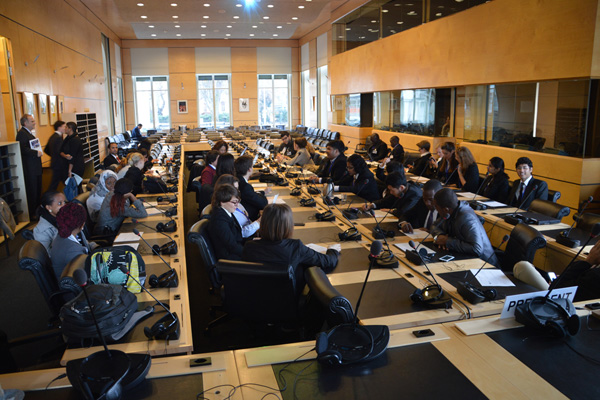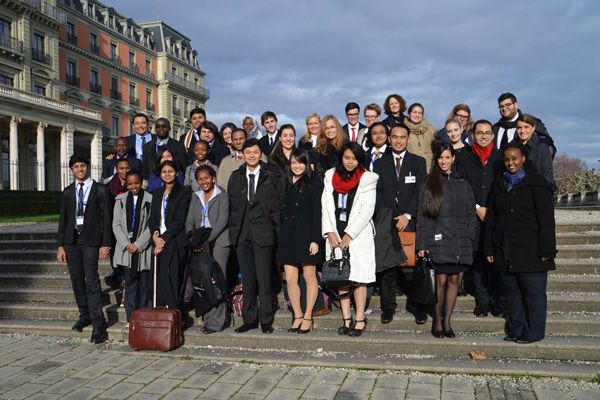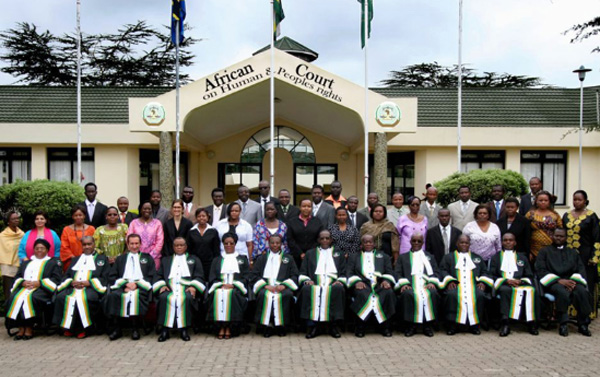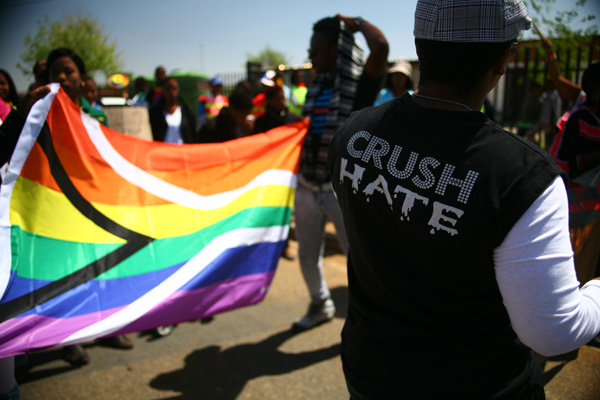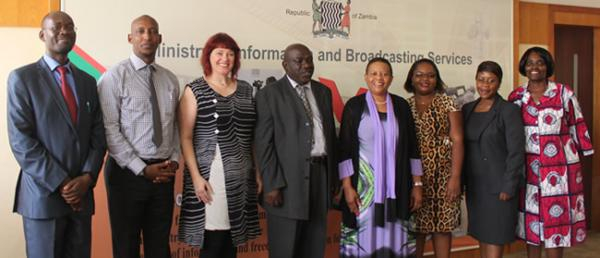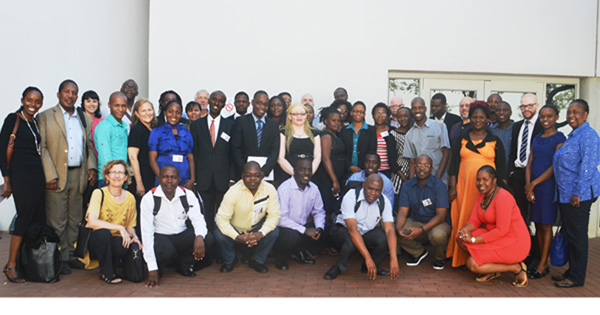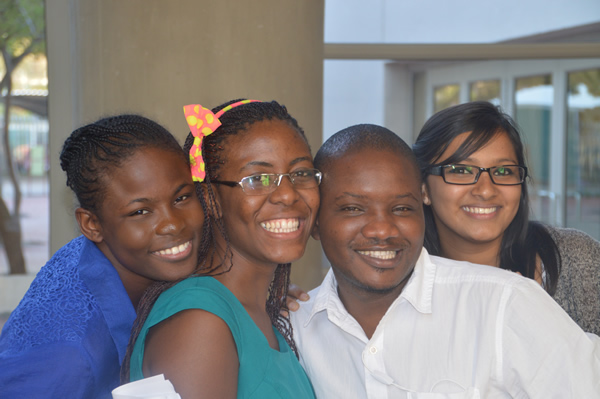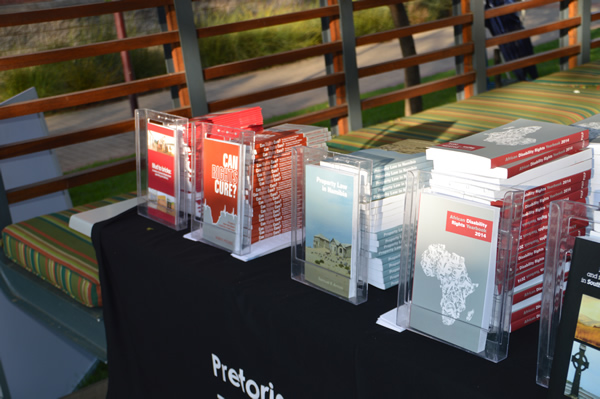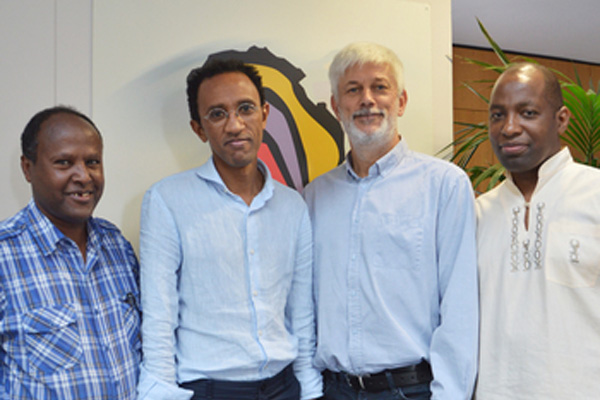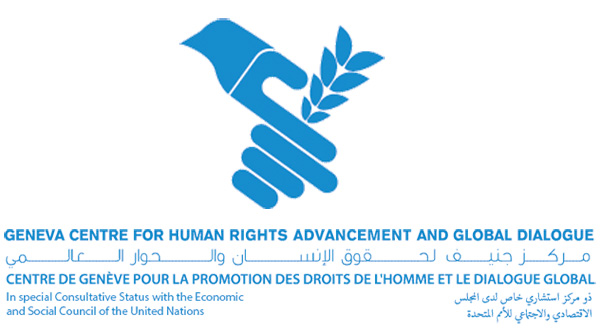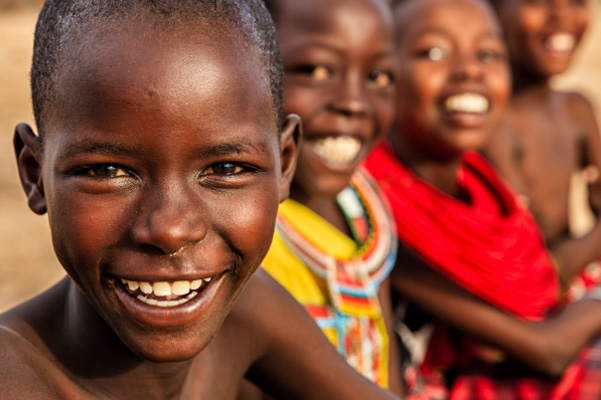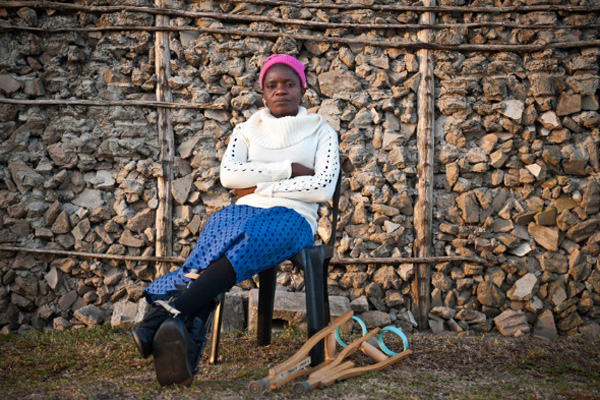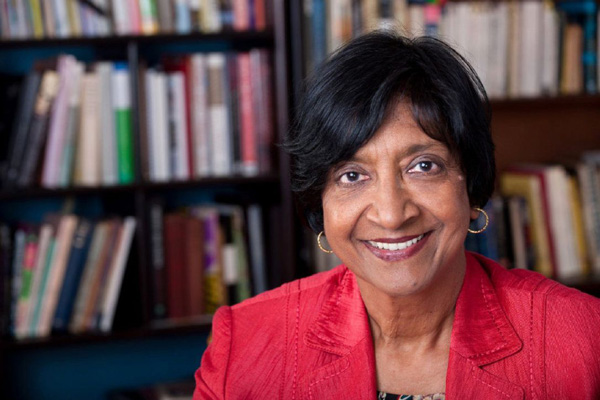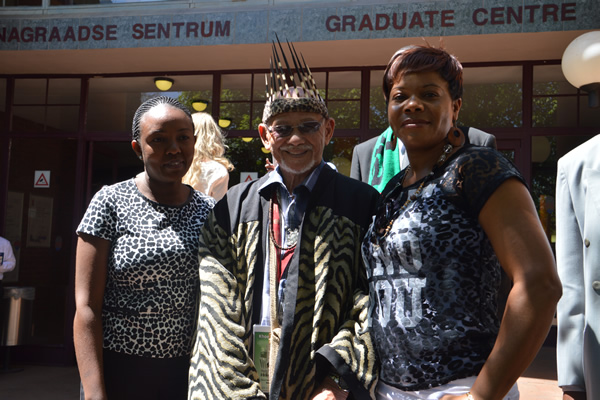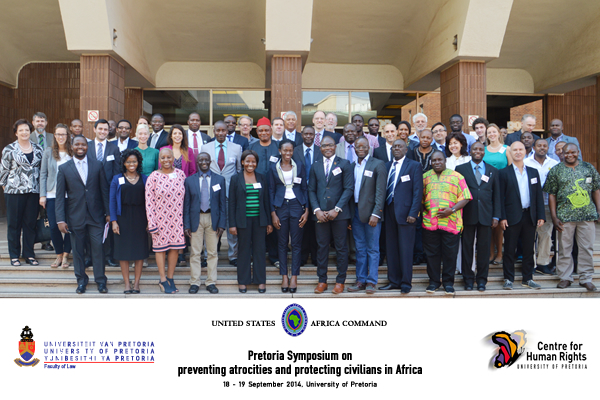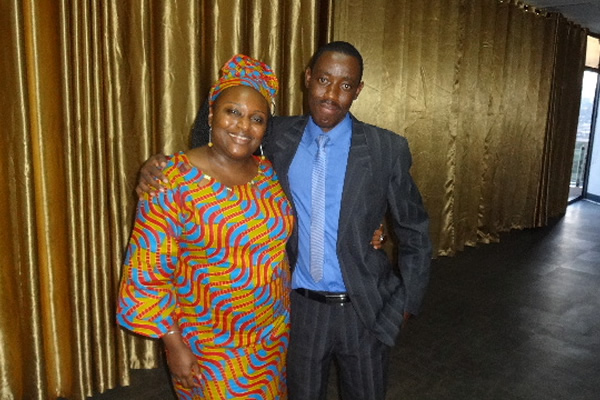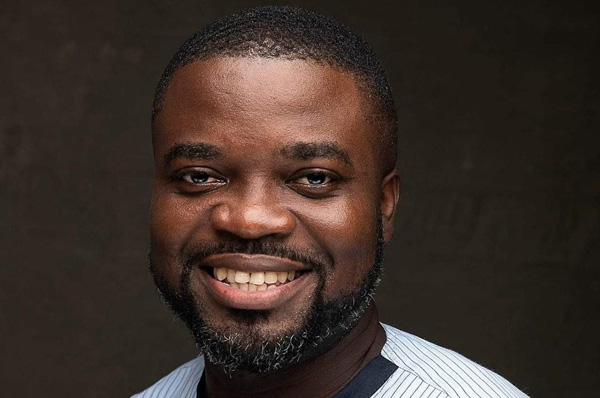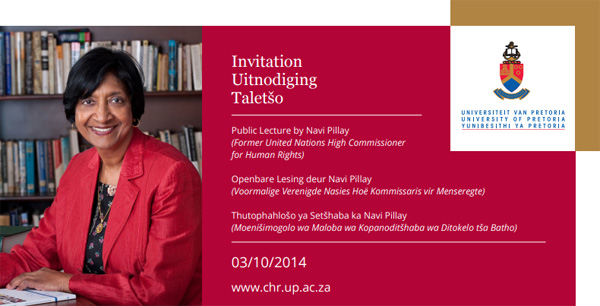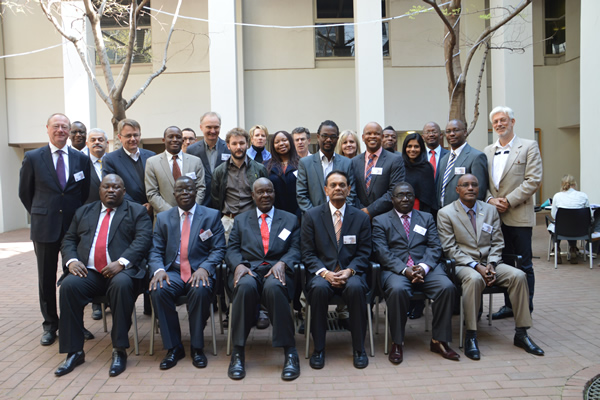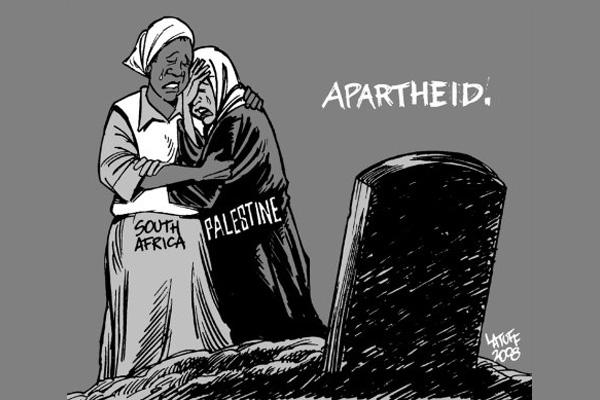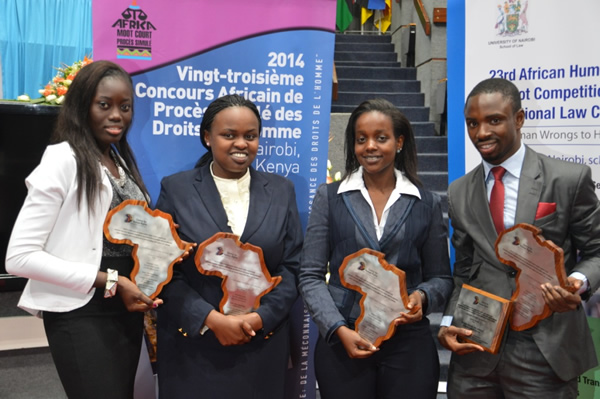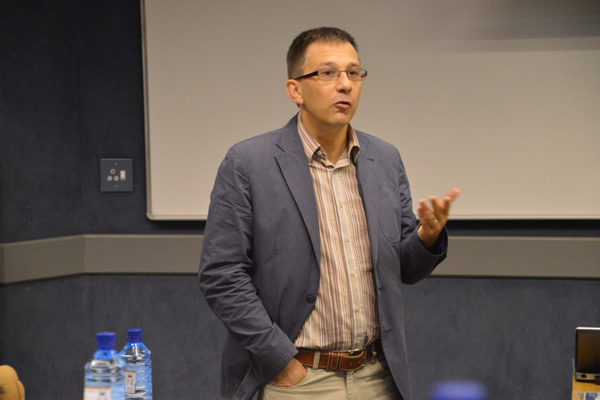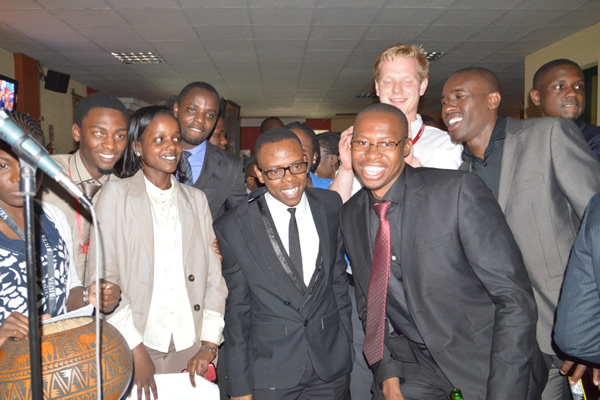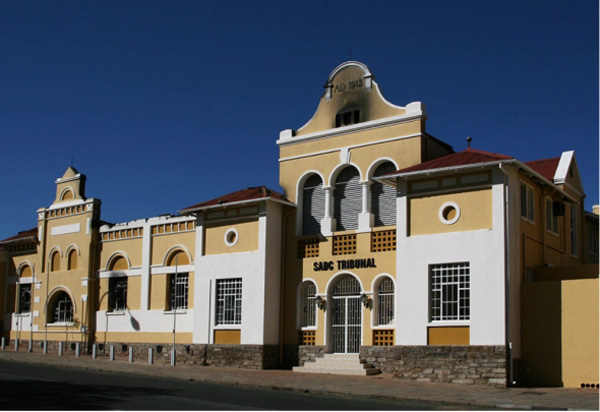- Details
Ashwanee Budoo from the Gender Unit at the Centre for Human Rights spoke to SABC Morning Live (video below) on the the naked protest staged at Rhodes University, where female students caused quite a stir last week when they protested against sexual violence half-naked.
Many people view human rights as a set of moral principles that apply to everyone. The recognition of human rights is important to people because they then feel like the society is treating them on an equal basis as others. It affords them the security that they will not be treated inferior to any other human being.
- Details
The LLM/MPhil in Human Rights and Democratisation in Africa (HRDA) is the flagship Masters Programme at the Centre for Human Rights, University of Pretoria. Since 2000, the programme has trained some of the best minds in Africa who have gone on to create change in different parts of the world.
These human rights experts that now make up the HRDA Alumni Association have through their relentless efforts demonstrated unwavering commitment to the values of human rights. Some have indeed laid down their lives in the defence of the rights of others.
- Details
The University of Pretoria joined the Scholars at Risk (SAR) network last year. SAR is an international network of over 250 academic institutions in 30 countries organized to support and defend the principles of academic freedom and to defend the human rights of scholars around the world.
In an on-going attempt to raise awareness of the importance of academic freedom, the Centre for Human Rights at the Faculty of Law, University of Pretoria on Monday 18 April 2016 hosted a public lecture on 'Academic freedom in Africa under attack: A tribute to Professor Gilles Cistac.' It was delivered by a scholar from one of the partners in the Centre’s Master’s programme, Dr Kwadwo Appiagyei-Atua, Senior Lecturer, Faculty of Law, University of Ghana, Legon, Accra.
This Master’s programme focus on human rights and democratisation in Africa and is presented in collaboration with 13 law faculties across the continent.
- Details
Centre for Human Rights condemns human rights violations in The Gambia and calls for relocation of AU African Year of Human Rights celebrations and seat of the African Commission.
- Details
The African Commission on Human and Peoples’ Rights (African Commission) on 7 April 2016 launched a report on sexual orientation and gender identity (SOGI).
This report, titled ‘Ending violence and other human rights violations based on sexual orientation and gender identity’, contains the proceedings and recommendations of a joint thematic dialogue on SOGI, which was held on 3 November 2015 between the African Commission, Inter-American Commission on Human Rights, and United Nations (UN) human rights mechanisms in Banjul, The Gambia, ahead of the 57th ordinary session of the African Commission. The dialogue, hosted by the African Commission, was supported and organized by the Office of the High Commissioner for Human Rights (OHCHR) and the Joint United Nations Programme on HIV/AIDS (UNAIDS). The dialogue built on recent developments in the African, Inter-American and UN human rights systems in relation to SOGI issues and aimed at sharing experiences and future possibilities and collaboration in ending violence and other human rights violations based on sexual orientation and gender identity.
![]() Download this report (English)
Download this report (English)
![]() Download this report (French)
Download this report (French)
- Details
Statement of the Centre for Human Rights
(University of Pretoria)
58th ordinary session of the African Commission on Human and Peoples’ Rights, Banjul, The Gambia, 7 April 2016
- Details
The Centre for Human Rights, Faculty of Law, University of Pretoria cordially invites you to a public lecture on 'Academic freedom in Africa under attack: A tribute to Professor Cistac'.
Speaker:
Dr Kwadwo Appiagyei-Atua
Member, Ghana Bar and Senior Lecturer, Faculty of Law, University of Ghana, Legon, Accra
CHR and ICAR Release Comprehensive Study of Business and Human Rights Law and Policy in South Africa
- Details
Today, the Centre for Human Rights (CHR) at the University of Pretoria and the International Corporate Accountability Roundtable (ICAR) are pleased to jointly release the “Shadow” National Baseline Assessment (NBA) of Current Implementation of Business and Human Rights Frameworks in South Africa.
This document represent one of the most exhaustive studies of South African laws, policies, regulations, and standards that pertain to business and human rights at the national level.
CHR and ICAR hope all stakeholders, including South African civil society groups, academia, government representatives, business groups, and investors, will engage with this tool, add to it, and apply it in their efforts to address business-related human rights harms.
![]() Download the “Shadow” NBA for South Africa
Download the “Shadow” NBA for South Africa
For more information, contact Josua Loots, CHR’s Program Manager for Business and Human Rights, at josua.loots@up.ac.za or Sara Blackwell, ICAR’s Legal and Policy Coordinator for the Frameworks Program, at sara@icar.ngo.
- Details
Four academics associated with the Centre for Human Rights contributed to the third volume in the Shifting Power and Human Rights Diplomacy series which contains a collection of eleven essays on South Africa’s foreign human rights policy. (Contributors: Prof Magnus Killander, Dr Dan Kuwali, Josua Loots and Bright Nkrumah).
- Details
Human rights have taken another knock this past week. On 16 March 2016, Nigeria’s Senate rejected the Gender and Equal Opportunity Bill, aimed at eliminating “all forms of discrimination” against women. The Bill was set to promote women’s equality in marriage, inheritance and education.
Lawmakers opposing the Bill said it is unnecessary, stating that the rights of everyone are already recognised in the Constitution. They further stated that the Bill is incompatible with Nigerian culture and religious beliefs. Religious texts and practices were cited as reasons to oppose the Bill.
However, women’s rights in Nigeria are dangerously lacking, as is evident in its discriminatory customary and religious laws pertaining to early and forced marriage, divorce, and ownership of property.
- Details
The Centre for Human Rights (CHR), University of Pretoria (UP), hosted the Disability Rights in an African Context advanced short course from 14 - 18 March 2016. The Disability Rights Course which is part of a series of advanced human rights courses offered by the Centre for Human Rights attracted over fifty participants from more than twenty different African countries. Participants included persons with disabilities, their families, civil society groups of persons with disabilities as well as advocates for disability law reform, lawyers, policy makers, policy analysts andLLM/MPhil students taking courses in human rights at the Centre for Human Rights amongst others.
- Details
Justice Johann van der Westhuizen retired from the South African Constitutional Court at the end of February 2016, after serving his term of 12 years. The year the Centre for Human Rights celebrates 30 years of its existence, Johann returns to the Centre he founded in 1986. He holds a part-time position of Extraordinary Professor in the Centre.
On 15 March 2016, honouring his term at the Court and welcoming him back, the Centre hosted a forum ‘Realising human rights in life and law: Reflections on the Constitutional Court term of Justice Johann van der Westhuizen’.
- Details
Last night in Mbizana, Eastern Cape, unknown attackers impersonating police officers assassinated the activist and chairperson of the Amadiba Crisis Committee at his home, in front of his young child. Sikhosiphi Bazooka Rhadebe from Mdatya village in Amadiba died on the scene after being shot in the head eight times.
Under Rhadebe’s leadership, the Amadiba Crisis Committee has been resisting proposed mineral sands mining at Xolobeni on the Wild Coast by a subsidiary of Australian mining company Mineral Commodities Limited (MRC), including through legal action.[1]
- Details
The Faculty of Law at the University of Botswana launched the Disability Rights Teaching Project on 23 March 2016. Mr. Tshepiso Ndzinge Makhamisa, coordinator of the Disability Rights Teaching Project at the University of Botswana and an alumni of the LLM in Human Rights and Democratisation in Africa speaking at the launch informed delegates that the overall goal of the project is to develop a pool of lawyers with specialised knowledge and skills in disability rights and at the same time promote disability rights awareness, education and raise academic interest (scholarship) on disability rights in Botswana. The University of Botswana commenced the teaching of Disability Rights in 2015 and will continue teaching it as part of the Human Rights Law Module. Plans are underway to establish a Disability Rights Clinic to engage in strategic litigation on the rights of persons with disabilities.
- Details
On 11 March 2016, the Centre of Human Rights, Faculty of Law, University of Pretoria, held a panel discussion on the legal and political consequences of Rwanda’s withdrawal of its declaration under article 34(6) of the Protocol to the African Charter on Human and Peoples’ Rights on the Establishment of an African Court on Human and Peoples’ Rights (African Court Protocol), which provides for the right of individual access to the African Court on Human and Peoples’ Rights (African Human Rights Court). The panel discussion consisted of Professor Frans Viljoen, Director of the Centre for Human Rights; Professor Dire Tladi, Professor, Department of Public Law, Faculty of Law, University of Pretoria and a member of the International Law Commission; and Professor Michelo Hansungule, Professor, Centre for Human Rights; and legal counsel in two of the cases against Rwanda submitted to the Court.
- Details
The week of 14 March to 21 March 2016 is Anti-Racism Week and 21 March 2016 is Human Rights Day in South Africa. This is the day in 1960, on which the police shot 69 people while they were peacefully protesting against the pass laws in Sharpeville, Johannesburg.
The legacy of the racist and skewed apartheid system has to be continually taken on. Transformation needs to be pursued with determination and zeal. Race is one of the divides that was used to disunite South Africa in the past and still continues to rear its ugly head every once in a while in many areas of life, including University life.
- Details
On Sunday afternoon the Helen Suzman Foundation (HSF) offices in Parktown, Johannesburg were the target of a military-style raid. Those conducting the raid clearly knew what they were looking for: computers and other documentation relating to the programmatic work of the HSF were taken. The brazen, co-ordinated nature of the operation and its targeted, selective focus are sinister. So, too, is its timing.
In its bid to promote constitutional democracy, the HSF undertakes vital but often politically sensitive and contentious activity. Among its most recent activities was the launch last Wednesday of an application in the Pretoria High Court to block the head of the Hawks from exercising any of his powers pending the outcome of its application to have his appointment set aside as irrational and unlawful.
- Details
Human Rights Day in South Africa is historically linked with 21 March 1960, and the events of Sharpeville. On that day 69 people died and 180 were wounded when police fired on a peaceful crowd that had gathered in protest against the Pass laws.
This day marked an affirmation by ordinary people, rising in unison to proclaim their rights. It became an iconic date in South Africa's history that today we commemorate as Human Rights Day as a reminder of our rights and the cost paid for our treasured human rights.
- Details
The Centre for Human Rights, University of Pretoria and the School of Law, University of Ghana cordially invite you to the
Annual Helen Kanzira Memorial Lecture.
Keynote address:
Ms Bernice Sam - ‘Protecting Women’s Reproductive Rights in Africa: A moral or legal obligation?’
Panelists:
Dr Lydia Aziato, Dr Amos Laar and Ms Vicky Okine
- Details
The Centre for Human Rights (the Centre) is delighted to note that the Botswana Supreme Court of Appeal ruled against the Attorney General of that country, and chose to uphold the decision of a lower court instructing the relevant government department to register the organisation Lesbians, Gays and Bisexuals of Botswana (LEGABIBO) as an NGO in Botswana.
- Details
The International Development Law Unit, Centre for Human Rights, Faculty of Law, University of Pretoria is pleased to announce that from 2017, its prestigious LLM in International Trade and Investment Law in Africa will commence in January 2017 instead of July as was the case in previous years.
This change has been made in order to enrich the LLM programme, and to make it more responsive to new developments in international trade and investment law such as the growing body of international norms and standards dealing with business and human rights and the growing recognition by business of their social and environmental responsibilities.
- Details
The Centre for Human Rights (CHR), Faculty of Law, University of Pretoria, welcomes the clarity provided in the Supreme Court of Appeal (SCA) judgment in the case of The Minister of Justice and Constitutional Development and Others v The Southern Africa Litigation Centre and Others, on the matter of the visit of the Sudanese head of state, President Omar al-Bashir, to South Africa, and the failure of the South African government to arrest him in accordance with South Africa’s obligations under the International Criminal Court (ICC) and the Implementation of the Rome Statute of the International Criminal Court Act 27 of 2002 (ICC Act).
- Details
The 25th African Human Rights Moot Court Competition will be jointly hosted by the University of The Gambia and the African Commission on Human and Peoples’ Rights from 16 to 21 October 2016 in Banjul, The Gambia.
The African Human Rights Moot Court Competition will be held for the first time in The Gambia, known as the ‘Smiling Coast of Africa’. Situated in West Africa and one of the smallest countries in mainland Africa, The Gambia is renowned for its majestic River Gambia, a unique and natural waterway that extends through the length of its territory. The Gambia remains an unspoiled tropical paradise.
From the white sand beaches on the Atlantic Coast to the rural village of Juffureh, a stone’s throw from ‘Kunta Kinteh Island’, the smiling people of The Gambia warmly welcome Africa to the 25th African Human Rights Moot Court Competition.
- Details
The United Nations Special Rapporteur on the situation of human rights in Eritrea, Sheila B. Keetharuth, today provided an oral update to the Human Rights Council, focusing on the plight of unaccompanied Eritrean children crossing international borders. Since her first report in 2013, the Special Rapporteur has kept a focus on this pressing issue, as the numbers of children leaving Eritrea kept rising.
Ms. Keetharuth reiterated her continuing deep concern about the overall human rights situation in the country, pushing many Eritreans, including children to leave the country. “They embark on the journey across borders into neighbouring countries and further afield. Human rights violations they experienced has a ripple effect, leading to their increased vulnerability”.
- Details
The Centre for Human Rights, Faculty of Law, University of Pretoria, cordially invites you to a panel discussion on the topic: Considering the implications of Rwanda’s withdrawal of the right of individual access to the African Human Rights Court.
- Details
On 26 February 2016, the Centre for Human Rights in collaboration with the Mauritius Council of Social Services (MACOSS) organised a workshop in Port Louis, Mauritius.
The purpose of the workshop was to create an increased understanding of the right of access to information (ATI) amongst stakeholders in Mauritius and also to begin initial discussions on the content of an ATI law for Mauritius. The workshop was attended by a broad range of stakeholders including government officials, the Law Society of Mauritius, academics, media and civil society organisations.
- Details
The right to life is often described as a supreme human right, but it is clearly under pressure worldwide. The premier human rights body of the African Union on Monday released a significant new guide on how states and societies in Africa, and indeed worldwide, should protect this right.
- Details
A recent conference organised by the Centre for Human Rights shed light on the successes of the African Commission on Human and Peoples’ Rights (African Commission) in influencing the adoption of access to information legislation across Africa.
On Wednesday 9 December 2015, the Centre for Human Rights hosted a conference on ‘Soft Law and Human Rights: The Impact of the Model Law on Access to Information for Africa’, at the Senate Hall of the University of Pretoria. The conference brought together participants from across all sub-regions of Africa which included: academics, students, civil society actors and a variety of public officials.
- Details
The pilot episode of HRDA Chronicles features Melanie Smuts - an alumna from the HRDA Class of 2012, who established Streetlight Schools - an initiative aimed at providing high quality and affordable education to children in South Africa.
- Details
The Centre for Human Rights, Faculty of Law, University of Pretoria, regrets the decision by the ANC’s National General Council, this weekend, that South Africa should withdraw from the ICC Statute. Although this is a political decision, which still has to be converted into a legally binding format, decisions by the highest policy-making organ of the ruling party, the ANC, are highly influential. It calls on the ANC to engage in an inclusive and participatory process, involving all national and international stakeholders.
- Details
The African Committee of Experts on the Rights of the Child (African Children’s Rights Committee) made public its third decision (Communication 2/2009, Hansungule and Others (on behalf of children in Northern Uganda) v Uganda, decided at the Committee’s 21st ordinary session, 15-19 April 2013.) In this decision, the African Children’s Rights Committee finds that Uganda conscripted and used child soldiers, in violation of article 22(2) of the African Charter on the Rights and Welfare of the Child (African Children’s Charter). Article 22(2) provides that state parties to the African Children’s Charter must take ‘all necessary measures to ensure that no child shall take a direct part in hostilities and refrain, in particular, from recruiting any child’. A child is defined as anyone under the age of 18.
![]() Download this press statement
Download this press statement![]() Download the decision on the communication
Download the decision on the communication
- Details
The African Committee of Experts on the Rights of the Child (African Children’s Rights Committee) has made public its second finding on a communication (case) submitted to it. This case deals with the conditions of some 100,000 children (called talibés) who, while attending Qur’anic schools in Senegal, are required to beg on the streets of Dakar and other urban centres, to secure their own survival. The case was submitted as far back as 2012 by the Centre for Human Rights, University of Pretoria, and the NGO la Rencontre Africaine pour la Defense des Droits de l’Homme (RADDHO), Senegal (Centre for Human Rights and la Rencontre Africaine pour la Defense des Droits de l’Homme (on behalf of Senegales Talibés) v Senegal, ACERWC, Comm/001/2012, 15 April 2014.)
![]() Download this press statement
Download this press statement![]() Download the decision on the communication
Download the decision on the communication
- Details
On the occasion of Africa Day 2015, the Centre for Human Rghts (CHR) at the University of Pretoria, South Africa, is proud to announce the signature of a Memorandum of Understanding (MoU) with the National Human Rights Commission (NHRC) of Nigeria.
- Details
Around the continent, Africans today celebrate “Africa Day”. 25 May marks the day, just over half a century ago, in 1963, on which the African Union (AU)’s predecessor, the Organisation of African Unity (OAU), was formed. Its main initial aim was to eradicate the remaining vestiges of colonialism from Africa. It was, in fact, the OAU that spearheaded continental and global campaigns for the liberation of South Africa from apartheid. After the advent of the AU, around the turn of the millennium, the regional organization increasingly became less preoccupied solely with inter-state relations and took on a more people-centred posture, with its focus shifting to human security, poverty alleviation and economic growth.
- Details
From 18 to 21 May 2015, the Special Rapporteur on Freedom of Expression and Access to Information in Africa, Commissioner Pansy Tlakula, undertook an advocacy visit to the Republic of Malawi. The purpose of the visit was to meet with government officials and other stakeholders, to advocate for the adoption of an access to information law in accordance with regional and international standards on access to information as embodied in the Model Law on Access to Information for Africa (Model Law). The Special Rapporteur was accompanied during this visit by 4 expert members of the Working Group that developed the Model Law.
- Details
Violence against women is endemic in South Africa: a woman is killed by an intimate partner every eight hours, South Africa is regularly listed as having the highest rate of rape in the world and survivors of sexual violence receive inadequate and inconsistent treatment.
- Details
The Centre for Human Rights (CHR) at the Faculty of Law, University of Pretoria, in collaboration with a group of Eritrean human rights lawyers, launches a glossary of human rights terms in Tigrinya. This is in line with one of the CHR’s main objectives, that is a wider dissemination of publications on human rights in Africa, including the advancement of a human rights literature in indigenous African languages.
- Details
The advanced human rights short course on ‘Judicial enforcement of socio-economic rights in Africa’ is the third in the series of advanced short courses presented by the Centre for Human Rights at the University of Pretoria for 2015. It ran from 11 to 15 May 2015.
- Details
The Centre for Human Rights coordinates a project aimed at promoting disability rights awareness, education and scholarship in Southern Africa. As part of this project, the Centre for Human Rights of the University of Pretoria hosted the Disability Rights and Law Schools Project in Southern Africa Partner’s meeting between 8 - 10 April 2015. In addition to the CHR, the meeting brought together the following partner institutions: Midlands State University, Zimbabwe, University of Zambia, Chancellor College Malawi, Eduardo Mondlane, Mozambique, University of Dodoma, Tanzania, University of Namibia, University of Botswana, University of Nairobi, Kenya and Makerere University, Uganda.
- Details
An 'implementation crisis' is widely acknowledged to be afflicting regional and international human rights mechanisms posing a grave threat to their integrity and perceived legitimacy. Against this backdrop, regional and international bodies are pursuing efforts to strengthen their mechanisms for ensuring redress for victims of human rights violations and to ensure the swift and effective implementation of their decisions. This situation adds urgency to a debate which is long-established but remains unresolved: what does it mean to comply with international and regional human rights law and what factors influence whether States comply or not?
- Details
The Centre for Human Rights on 21 April 2015 launched a report deploring the state of freedom of expression, specifically, and the rule of law, more broadly, in Eritrea.
This report, entitled ‘The erosion of the rule of law in Eritrea: Silencing freedom of expression”, was prepared by students from the UN mandated University of Peace, in Costa Rica, and students and staff of the Centre for Human Rights. (The report is available open-access on the web site of PULP, web site link.)
- Details
On 21 April 2015 at the 56th Ordinary Session of the African Commission on Human and Peoples’ Rights (African Commission) in the capital of the Gambia, Banjul, the African Commission in collaboration with IPAS Africa Alliance launched General Comments on Article 14 of the Protocol to the African Charter on Human and Peoples’ Rights on the Rights of Women in Africa (the Maputo Protocol). This guide was distributedin Banjul but it is also available for download.
- Details
In this statement, the human rights situation in three countries is addressed: the country from which I come (South Africa); the country in respect of which a Centre report was launched earlier at the session (Eritrea); and the country where we all find ourselves (The Gambia).
- Details
Students of the 2015 LLM/MPhil (Human Rights and Democratisation in Africa) class speak out about the recent xenophobic attacks in South Africa.
- Details
- Details
The Centre for Human Rights is appalled and deeply concerned not only about the recent recurrence of xenophobic violence, particularly in KwaZulu-Natal, but also by its persistence, and its widespread nature and severity.
- Details
From 8 to 10 April 2015, the Special Rapporteur on Freedom of Expression and Access to Information in Africa, Commissioner Pansy Tlakula, undertook an advocacy visit to the Republic of Mauritius. The purpose of the visit was to meet with government officials to advocate for the adoption of an access to information law in accordance with regional and international standards on access to information as embodied in the Model Law on Access to Information for Africa (Model Law). The Special Rapporteur was accompanied during this visit by 4 expert members of the Working Group which developed the Model Law.
- Details
On 8 April 2015, the Centre for Human Rights welcomed the 16th set of students for its Masters Programme in Human Rights and Democratisation in Africa.
The class of 2015 is made up of 29 outstanding individuals from 16 African countries as well as from France, Germany and Ukraine
- Details
March 21st is both a celebration of how far South Africa has come, as well as an occasion of sombre remembrance of those who gave their lives so that we can be free. We know it as Human Rights Day, but it is also the International Day for the Elimination of Racial Discrimination, World Down’s Syndrome Day, which advocates the rights and inclusion of those with Down’s Syndrome, and World Poetry Day.
- Details
The Centre for Human Rights, Faculty of Law, University of Pretoria, cordially invites you to the 2015 Welcoming Ceremony to welcome the 2015 students on the Master’s programme in Human Rights and Democratisation in Africa.
- Details
The Centre for Human Rights at the Faculty of Law is very fortunate to be hosting the renowned visiting scholar Prof Rebecca Cook at the University of Pretoria. Prof Cook is Professor Emerita and Co-Director of the International Reproductive and Sexual Health Law Programmeat the University of Toronto in Canada.
- Details
Gathered in the very charming auditorium of the Plant Sciences were extra-ordinary guests hosted by the Centre for Human Rights on the special occasion of the German Delegation's visit to the University of Pretoria. Among the German delegates were representatives of the Deutscher Akademischer Austausch Dienst (DAAD) and other officials of the German government.
- Details
The Centre for Human Rights, University of Pretoria, hosted an advanced short course with a focus on the effective implementation of disability rights in Africa from 9 - 13 March 2015.
- Details
The African Union (AU) Peace and Security Council (PSC) should immediately consider, publish and disseminate the final report of the Commission of Inquiry into human rights violations and abuses committed in South Sudan said 76 organizations in an open letter to the 15 PSC member states.
- Details
The Centre for Human Rights (CHR), together with the Centre for Applied Legal Studies (CALS), hosted an Africa regional consultation on National Action Plans (NAPs) for business and human rights. The consultation forms part of a larger project driven by a coalition that consists of CALS, CHR, Singapore Management University (SMU) and other individual experts. The aim of the project is to gather a global South perspective on the content and development process of NAPs for business and human rights. The project was mandated by the UN Working Group on Business and Human Rights (Working Group).
- Details
The Centre for Human Rights has learned with shock and distress of the assassination of Prof Gilles Cistac. He was shot four times in the chest by unidentified gunmen in Maputo this morning, Tuesday 3 March 2015. The Centre wishes to express its sincere condolences to the family of Gilles Cistac for the loss of our good friend and esteemed colleague. We join Gilles Cistac’s friends, colleagues and indeed the people of Mozambique in expressing our sadness and outrage at this huge loss to his family, to academia and the legal profession, and to the fraternity of human rights defenders.
- Details
The Competition Commission in partnership with the Centre for Human Rights at the Faculty of Law, University of Pretoria cordially invites you to a public seminar on ‘The Contribution and Impact of Competition Policy on Socio- Economic Rights’ which will be presented by Former Chief Justice Sandile Ngcobo.
- Details
Mr Thulani Maseko, 2005 alumnus of the Master’s Degree Programme in Human Rights and Democratisation in Africa from Swaziland, is serving a two-year prison sentence in his country for criticising the government. Those who have met him in prison speak eloquently of the intelligent, compassionate and tireless human rights activist devoid of bitterness, hatred or anger. Surrounded by prison walls, he has turned his care and commitment to the welfare of his fellow prisoners, relating to everyone – including his gaolers – with generosity and equanimity.
- Details
The Centre for Human Rights feels compelled to comment on recent remarks by the South African Speaker of the House of Assembly, when she said "If we don't work we will continue to have cockroaches like Malema roaming all over the place," at the Mmabatho Civic Centre in Mafikeng.
- Details
International Day of Zero Tolerance for Female Genital Mutilation – is dedicated annually to making the world aware of the harmful effects of female genital mutilation or cutting (FGM/C) and to promote its eradication [1]. FGM/C involves the partial or total removal of external female genitalia; a deep form of discrimination against women and girls, it directly violates their right to health, and physical integrity. The practice is rooted in cultural and religious beliefs of communities who perceive it as a social obligation to control female sexuality and ‘preserve or protect’ a woman’s chastity.
- Details
On 4 and 5 February 2015, the Commonwealth Parliamentarians Association UK held a conference to celebrate 800 years of the Magna Carta. The Conference 'Human Rights in the Modern Day Commonwealth: Magna Carta to Commonwealth Charter’ brought together nearly 50 Commonwealth parliamentarians to explore the fundamental importance of human rights and the development of protections for these rights in law from 1215 to 2015.
- Details
On Wednesday 4 February 2015, the Centre for Human Rights and the Law Society of South Africa hosted a colloquium titled “Quo Vadis Public Protector”. The panelists were Mr John Jeffrey (South Africa’s Deputy Minister of Justice and Constitutional Development), Adv Thuli Madonsela (South Africa’s Public Protector), Justice Zak Yacoob (retired judge of the South African Constitutional Court), Prof Mtende Mhango (Deputy Head of the School of Law, University of the Witswatersrand) and Mr Law Naidoo (Executive Secretary, Council for the Advancement of the South African Constitution).
- Details
The Centre for Human Rights expresses serious displeasure at the recent xenophobic attacks and looting of foreign-owned shops in Soweto, Atteridgeville and other areas within the Gauteng province of South Africa.
The recent xenophobic violence has laid bare the aching soul of our nation and challenged each one of us to re-examine what we are doing to preserve the delicate social fabric of the post-1994 democratic South Africa. It is true that the greatest display of African unity was its undivided solidarity with the struggle against apartheid. It is sadly ironic, therefore, that those who lost their lives and property have done so at the hands of the very people whose humanity a united Africa had fought for.
- Details
On 27 January the Centre for Human Rights hosted the Dutch Special Envoy for the Global Conference on Cyberspace, Mr Uri Rosenthal, who outlined the topics of the Global Conference on Cyberspace (GCCS2015) that will be held in The Netherlands, The Hague, in April 2015.
- Details
The Centre for Human Rights is delighted to announce that the 24th edition of the African Human Rights Moot Court Competition will be held from 31 August to 5 September 2015 at the University of Zambia.
Online Faculty registration (Step 1) opens at Thursday 29 January 2015.
- Details
The latest edition of the African Human Rights Law Journal (AHRLJ Volume 1 No 2 2014) is now available on the Open Access Journal's website. All the previous editions are also available on the website.
- Details
The Centre for Human Rights, together with the Institute for Human Rights and Business' office in Kenya, hosted a consultation for East Africa on behalf of the African Commission Working Group on Extractive Industries, Environment and Human Rights violations in Nairobi, Kenya, from 19 - 21 January 2015. The consultation brought together representatives from civil society, national human rights institutions, affected communities and role players from the extractive sector in East Africa for a three day consultation focusing on challenges, best practices and the way forward in the sub-region. The Working Group was represented by Commissioners Pacifique Manirakiza and Lawrence Mute, and Expert Members Clement Voule, Sheila Keetharuth and Eric Kassongo.
- Details
The publication 'Convergence and Conflicts of Human Rights and International Humanitarian Law in Military Operations' (edited by Erika de Wet and Jann Kleffner and published by the Pretoria University Law Press) is now available online.
- Details
From 19 to 21 January 2015, the Special Rapporteur on Freedom of Expression and Access to Information in Africa, Commissioner Pansy Tlakula, undertook an advocacy visit to the Republic of Seychelles. The purpose of the visit was to meet with government officials to advocate for the adoption of an access to information law in accordance with regional and international standards on access to information as embodied in the Model Law on Access to Information for Africa (Model Law). The Special Rapporteur was accompanied during this visit by 3 expert members of the Working Group which developed the Model Law.
- Details
On 10 December 2014, the University of Pretoria held a graduation ceremony for students from the Masters programmes offered by the Centre for Human Rights and the Faculty of Law in the University of Pretoria. There were also some doctoral candidates who graduated on this occasion. The Graduation Ceremony marked the 15th Graduation Ceremony of students from the Master’s in Human Rights and Democratisation in Africa offered by the Centre for Human Rights. Each year, the Centre's human rights students graduate on International Human Rights Day (10 December 2014).
Ms Philina Wittke, Head of the DAAD South Africa Information Center delivered the keyonote speech.
- Details
The 6th Nelson Mandela World Human Rights Moot Court Competition was held in Geneva, Switzerland from 8 to 10 December 2014. Established in 2009, the main objective of the competition is to bring together students, law professors and human rights lawyers from different legal systems to debate and discuss contemporary cross-cutting human rights issues. The competition is organised in collaboration with the United Nations Office of the High Commissioner for Human Rights.
After being held in Pretoria for the 5 past years, the United Nations Offices in Geneva hosted the Competition for the first time in 2014. The executors of the estate of the late President Nelson Mandela granted permission for the competition to be named after the great statesman and human rights icon, Nelson Mandela (the event was previously simply called ‘World Human Rights Moot Court Competition’).
- Details
The Sixth Nelson Mandela World Human Rights Moot Court Competition will be held from 8 to 10 December 2014, at Palais des Nations in Geneva, and will bring together 45 participants from 15
universities in 12 countries, representing all 5 United Nations regions of the world.
Teams from universities in the following countries have qualified to participate in the final round of the 6th World Human Rights Moot Court Competition, which will for the first time be called the Nelson Mandela World Human Rights Moot Court Competition: Argentina, Australia, Belarus, Greece, India, Indonesia, Kenya, Singapore, Slovenia, Poland, Switzerland and South Africa.
- Details
The Centre for Human Rights, University of Pretoria, has welcomed a decision of the African Court on Human and Peoples’ Rights in the case of Konaté v Burkina Faso to rule that imprisonment for defamation violates the right to freedom of expression and that criminal defamation laws should only be used in restricted circumstances.
The highest court in Africa, in its judgement handed down on 5 December 2014, in Addis Ababa, sent a strong message that governments may not use severe criminal penalties to stifle public debate and reporting on matters of public interest.
- Details
On 8 and 9 December 2014, the Centre for Human Rights hosted a Colloquium on the theme ‘Sexual Minority Rights: Charting the Way Forward’.
This event comes in the wake of the adoption of increasingly repressive laws in many African countries (such as The Gambia, Nigeria and Uganda), on the one hand, and the adoption by the African Commission on Human and Peoples’ rights of its first resolution on sexual orientation and gender identity (SOGI), on the other. Speakers at the Colloquium touched upon the situation pertaining to the rights of lesbian, gay, bisexual, transsexual and intersexed (LGBTI) persons in Southern, West/Central and Eastern Africa.
- Details
On 12 and 13 November 2014, the Special Rapporteur on Freedom of Expression and Access to Information in Africa (the Special Rapporteur), Commissioner Pansy Tlakula, in collaboration with the Centre for Human Rights, Media Institute of Southern Africa Zambia (MISA-Zambia), and members of the Decriminalisation of Expression (DOX) Campaign, organised a stakeholders meeting on the decriminalisation of laws limiting Freedom of Expression, in Lusaka, Zambia.
- Details
The Centre for Human Rights at the Faculty of Law, University of Pretoria cordially invites you to the LLM/MPhil (Human Rights and Democratisation in Africa) Class of 2014: Graduation Ceremony
During an intensive one-year course, students on this programme are taught by eminent lecturers in the field of human rights and gain invaluable practical exposure. It is the only course of its kind in Africa.
- Details
The Gender Unit of the Centre for Human Rights organised a 3-day workshop on increasing States’ capacity for reporting under the Protocol to the African Charter on Human and Peoples’ Rights on the Rights of Women in Africa (the Women’s Protocol). This was organised in collaboration with the Special Rapporteur on the Rights of Women in Africa of the African Commission on Human and Peoples’ Rights (African Commission), Commissioner Soyata Maiga. The workshop was held from 11 to 13 November 2014 at the Farm Inn Hotel, Pretoria.
Thirty key government and civil society stakeholders involved in the state reporting process in Tanzania, Seychelles, Zimbabwe and the Democratic Republic of Congo attended this workshop.
- Details
On 4 and 5 November 2014, the Centre for Human Rights, University of Pretoria, hosted an academic conference on disability rights with a focus on the effective implementation of the rights of women with disabilities in Africa. Fifteen papers were presented at the conference, on a diverse range of issues including political participation, access to education, sexual and reproductive rights, building an inclusive environment, resource allocation, access to justice and violence against women with disabilities. The conference drew participants from more than 15 countries and approximately 50 people attended the conference. Participants included persons with disabilities, their families, civil society groups as well as advocates for disability law reform, lawyers, policy makers, academics and practitioners from around the world.
- Details
On 3 and 5 November 2014 the Centre for Human Rights, with the support of OSISA, hosted the Second Southern African Disability Rights Moot Court Competition. Participants from the Network of Southern African Law Schools Disability Rights Programme participated in the second edition of this competition.
The problem being argued during the rounds concerned itself with issues regarding the rights of persons with disabilities including the right to vote for persons with intellectual disabilities.
- Details
The Pretoria University Law Press (PULP) held a book launch on Tuesday 4 November 2014, where seven of PULP's latest titles were introduced. PULP's third open-access online journal, the African Disablity Rights Yearbook, was also launched and can be viewed by visiting www.adry.up.ac.za.
The seven titles launched included:
- Can rights cure? The impact of human rights litigation on South Africa’s health system
– Author: Marius Pieterse - monograph - African Disability Rights Yearbook 2014
– Editors: Charles Ngwena; Ilze Grobbelaar-du Plessis; Heléne Combrinck; Serges Djoyou Kamga – journal and open access online journal - Promoting effective enforcement of the prohibition against corporal punishment in South African schools
–Written by Faranaaz Veriava, Commissioned by the Centre for Child Law, University of Pretoria - Mud to bricks: A review of school infrastructure spending and delivery
- Written by Carmen Abdoll and Conrad Barberton, Economists with Cornerstone Economic Research, Commissioned by the Centre for Child Law, University of Pretoria - Human dignity and fundamental rights in South Africa and Ireland
– Dr Anne Hughes Trinity College, Dublin - monograph - Property law in Namibia
– Prof Sam Amoo- Acting Director - Justice Training Centre (JTC) Faculty of Law, University of Namibia - monograph - Transformative constitutionalism: Comparing the apex courts of Brazil, India and South Africa
– Editors: Oscar Vilhena, Upendra Baxi and Frans Viljoen – collection of work from various authors'
- Details
The human rights situation in Eritrea was the subject of attention of key decision-makers who met to discuss the challenges faced in that country. The situation in Eritrea resulted in thousands of Eritreans fleeing the country, sometimes under dangerous conditions.
The Centre for Human Rights in collaboration with the Eritrean Movement for Democracy and Human Rights (EMDHR) hosted a seminar on human rights in Eritrea on Wednesday 29 October 2014. Participants in the event included key decisions makers in South Africa and members of the diplomatic corps who were drawn from Africa, Europe and the Middle East. Also present were members of the Eritrean community in the diaspora. The seminar commenced with welcome remarks from Prof Frans Viljoen, the Director of the Centre for Human Rights.
The aim of the seminar was to create awareness about the prevailing human rights situation in Eritrea and to discuss the international response.
Mr Mussie Ephrem, a Swedish-Eritrean who is an analyst specialising in the Horn of Africa, began by providing a comprehensive background into the history of Eritrea. He explained how the country had through the years evolved from efforts to liberate its people from oppression only to descend into one of the most repressive states as far as human rights are concerned.
- Details
The Geneva Centre for Human Rights Advancement and Global Dialogue is a non-governmental, non-profit organisation based in Geneva, Switzerland. It works in cooperation with the United Nations Office of the High Commissioner for Human Rights and the United Nations Human Rights Council to promote and protect human rights through global dialogue. Its work brings together the full spectrum of national non-governmental and international human rights actors, through international conferences, human rights training, and advice to governments and related agencies.
The Centre for Human Rights of the University of Pretoria is both an academic department and a non-governmental organisation, which was founded in 1986 as part of domestic efforts against the apartheid system of that time. Its work mainly focuses on human rights awareness and education in Africa, as well as on the promotion and protection of the rights of women, indigenous peoples, and other disadvantaged and marginalized persons or groups across the continent.
Workshop to raise awareness among Southern African CSOs on children’s rights monitoring and advocacy
- Details
The Children’s Unit of the Centre for Human Rights of the University of Pretoria, the Child Rights Networks of Southern Africa (CRNSA) and Plan International is organising a Workshop for Southern African CSOs on Child Rights monitoring and advocacy.
Dates: 11-13 November 2014
Venue: University of Pretoria, Pretoria, South Africa
- Details
The Centre for Human Rights at the Faculty of Law, University of Pretoria cordially invites you to a conference on the effective implementation of the rights of women with disabilities in Africa.
The Conference is on the theme ‘Overcoming obstacles: Towards the effective implementation of the rights of women with disabilities in Africa’ and will be presented by scholars, practitioners and disability activists from all over the world, but particularly from Africa.
Date: 4 and 5 November 2014
Time: 09:00 to 17:00
Venue: Auditorium,Plant Sciences Building, Hatfield Campus, University of Pretoria, Pretoria, South Africa
RSVP: Kindly confirm your attendance by Friday 31 October 2014 by sending an email to carole.viljoen@up.ac.za
Enquiries: Ms Carole Viljoen (012 420 3810 / carole.viljoen@up.ac.za)
GPS: 25°45’16.5”S 28°14’01.5”E
No registration fee is charged but pre-registration is compulsory.
- Details
The Centre for Human Rights was on Friday 3 October 2014 privileged to play host to Ms Navi Pillay, former United Nations High Commissioner for Human Rights. She delivered a public lecture on her work as High Commissioner in the Senate Hall of the University of Pretoria.
In her introduction, Prof Cheryl de la Rey, Vice-Chancellor and Principal of the University of Pretoria, spoke of Ms Pillay’s background in the anti-apartheid struggle as the first black woman to qualify as an advocate in the Natal Province, the first woman to open her own legal practice, and the first South African woman to obtain a Doctorate in Law from Harvard University. She described Ms Pillay as a great friend and supporter of the University of Pretoria and especially of the Centre for Human Rights, with which she has been associated for some 20 years. Ms Pillay was awarded the 2001 Women in Law Award by the Centre for Human Rights, and is the recipient of an Honorary Doctor of Laws degree from the University of Pretoria (December 2009).
- Details
The penultimate advanced human rights short course for this year was presented by the Centre for Human Rights at the University of Pretoria on - Indigenous Peoples’ Rights. It ran from 15 through 19 September, attracting participants and facilitators from across the world.
The UN Declaration on the Rights’ of Indigenous Peoples adopted by the UN General Assembly in 2007 came to the fore once more as participants engaged on the concept of ‘Indigenous Peoples’, land rights, gender views, international and national standards, regional mechanisms, climate change, challenges of and relevant ILO instruments relating to Indigenous Peoples’ Rights.
Participant’s views
“This course has given new strength and energy to engage the non-government and government for a process forward. My call is for an African Indigenous Network Alliance.
– Paramount Chief! Kora Hennie van Wyk, South Africa.
“The course provides a golden opportunity to participants from all-over Africa to interact, learn and share ideas and strategies on advocacy for the rights of indigenous peoples’.”
– Achero David Mufuayia, Kenya.
- Details
The Centre for Human Rights, Faculty of Law, University of Pretoria, South Africa, with the assistance of the United States Africa Command (AFRICOM) through the Africa Military Law Forum (AMLF), held a symposium at the University of Pretoria, South Africa, from 18 to 19 September 2014 on the theme: “All Means Necessary”: Bridging the Gap between the Doctrine of R2P and the Actual Protection of Civilians in Armed Conflicts.
The Symposium brought together over 80 high ranking military officers of African states, academics, policy makers, and other practitioners in the field of protection of civilians who discussed, shared experiences and provided lessons learnt in order to find solutions to the legal, policy, and practical challenges involved in the drafting and adoption of the mandates for the protection of civilian (PoC) by the United Nations (UN) Security Council and their implementation on the ground.
- Details
On 9 and September 2014, the Centre for Human Rights, in collaboration with the Open Democracy and Sustainable Development Initiative (ODESUNDI) and the Open Society Justice Initiative, held a meeting with local stakeholders on in Kigali, Rwanda on the implementation of the project on utilising access to information for the realisation of sexual and reproductive health rights of women in Rwanda.
- Details
Mr Joojo Cobbinah, a Ghanaian alumnus of the Human Rights and Democratisation in Africa (HRDA) masters’ programme (2013) was arrested on Saturday, 6th September 2014 on the orders of the Chief Executive of the Accra Metropolitan Assembly (AMA), also known as the Mayor of Accra.
Mr Cobbinah (the 2011 Human Rights Defender Award recipient and 2009 GJA Best Health Reporter) who is a journalist and a producer with Multi TV had gone with a team to film the living conditions of the people of Mensah Guinea community. This was after the AMA had demolished their houses upon a three days notice, rendering them homeless. As a result some of those displaced including women and children, slept in the open for lack of alternative housing arrangements.
- Details
The Centre for Human Rights and the Department of Mercantile Law at the Faculty of Law, University of Pretoria, invites you to a talk by Prof Nick Huls from Leiden University, The Netherlands on
‘Rwanda: Rule of Law in the Mist’.
Prof Nick Huls has worked for a couple of years in Rwanda with judges, prosecutors and legislative drafters. After explaining the title of his talk, he will discuss the strengths and weaknesses of the core institutions of the Rwandan legal system.
- Details
The Centre for Human Rights, Faculty of Law, University of Pretoria, cordially invites you to a public lecture by Navi Pillay.
Navi Pillay is the former United Nations High Commissioner for Human Rights and will reflect on her time at the UN and discuss future human rights challenges.
- Details
The Centre for Human Rights, Faculty of Law, University of Pretoria, in collaboration with the Konrad Adenauer Stiftung, held a Round Table to discuss the restoration of the Southern African Development Community (SADC) Tribunal on 28 and 29 August 2014.
![]() Download the concluding statement
Download the concluding statement
![]() Download a detailed recap of the Round Table
Download a detailed recap of the Round Table
The Round Table was attended by different stakeholders including former judges of the SADC Tribunal; a former judge of the East African Court of Justice (EACJ); officials from the SADC Tribunal, EACJ and Economic Community of Western African States (ECOWAS) Court of Justice; lawyers from private and academic practice and officials from the Department of Justice, South Africa; the South African Law Society; researchers; and members of civil society.
- Details
The Centre for Human Rights, Faculty of Law, University of Pretoria, invites you to a talk by Prof Robert Wintemute from King’s College, London on ‘Israel-Palestine Through the Lens of Racial Discrimination Law: Is the Analogy with South African Apartheid Accurate?’
- Details
The combined team from the University of Nairobi, Kenya and the Université Gaston Berger Saint-Louis du Sénégal , who argued for the Applicant are the winners of the 23rd African Human Rights Moot Court competition.The runners-up, arguing for the Respondent, are the teams from University of Pretoria, South Africa and Université Félix Houphouët-Boigny, Côte d'Ivoire.
The winning team members are:
- Eva Wangui Kimani, University Of Nairobi
- Moreen Wanjiru Mwangi, University Of Nairobi
- Mansour Fall, Université Gaston Berger De Saint Louis, Senegal
- Marguerite Ounane Thiare, Université Gaston Berger De Saint Louis, Senegal
The runners-up are:
- Alastair Dey Van Heerden, University Of Pretoria
- Ralph Tinomutenda Chitambira, University Of Pretoria
- Nadia Colette Wadja, Université Félix Huphouet Boigny Abidjan, Côte d'Ivoire
- Yacouba Sylla Koita, Université Félix Huphouet Boigny Abidjan, Côte d'Ivoire
Congratulations to the winners, runners-up and all the particpants!
- Details
The advanced short course titled 'The Right to Development in Africa'is the eight of ten short courses scheduled for presentation by the Centre for Human Rights at the University of Pretoria in the current year. It ran from 25 to 29 August 2014 and was the result of a collaboration between the Centre for Human Rights at the Faculty of Law, University of Antwerp, Belgium and was supported by the Delegation of the Flemish Government in South Africa.
This intensive week-long programme attracted participants from all the regions of Africa as well as Europe. Experts in development thinking, both from Africa and Europe, provided fresh insights and approaches to the ‘controversial’ issues around the subject of ‘Right to Development.’
Some of the speakers were:
- Prof Michelo Hasungunle (Centre for Human Rights, University of Pretoria)
- Prof Wouter Vandenhole (University of Antwerp and UNICEF Chair in Children’s Rights)
- Dr Rita Ozoemena (Researcher, SAIFAC, University of Witwatersrand, South Africa)
- Prof Cephas Lumina (Extra-ordinary Professor, Centre for Human Rights, University of Pretoria)
- Dr Donald Rukare (Chief Executive Officer, Governance and Policy Research Centre, Uganda)
- Details
The Centre for Human Rights, in collaboration with the University of Nairobi is hosting the 23rd edition of the African Human Rights Moot Court competition.
This year, the competition will run from 1-6 September and is held in Nairobi, Kenya.
During the second and third day of the competition, student teams from various universities on the continent argue a hypothetical case before a panel of judges.
This year, due to the smaller number of teams that were registered, there will only be 2 Anglophone and 2 Francophone teams in the final. There will not be any Lusophone teams arguing in the final round.
- Details
The Centre for Human Rights at the Faculty of Law, University of Pretoria, invites you to the Pretoria Symposium on preventing atrocities and protecting civilians in Africaa
ALL MEANS NECESSARY: BRIDGING THE GAP BETWEEN THE DOCTRINE OF R2P AND THE ACTUAL PROTECTION OF CIVILIANS IN ARMED CONFLICT
Date: Thursday 18 September and Friday 19 September 2014
Time: 08:30 - 17:30 (both days)
Venue: Merensky Library Auditorium, Hatfield Campus, University of Pretoria
RSVP: Kindly confirm your attendance by Monday 15 September 2014 by sending an email to bright.nkrumah@up.ac.za
Enquiries Bright Nkrumah (bright.nkrumah@up.ac.za ) / Carole Viljoen (carole.viljoen@up.ac.za)
There is no registration fee but pre-registration is compulsory. Refreshments and lunch will be provided for the duration of the conference.
- Details
The Centre for Human Rights, in collaboration with the University of Nairobi is hosting the 23rd edition of the African Human Rights Moot Court competition.
This year, the competition will run from 1-6 September and is held in Nairobi, Kenya.
The activites palnned for the first day of the competition inlcudes:
- Registration of teams for preliminary rounds
- Briefing session
- Opening ceremony
- Opening dinner
- Details
The Centre for Human Rights is hosting a Roundtable where the restoration of the SADC Tribunal will be discussed. This Roundtable is taking place on 28-29 August 2014 at the Faculty of Law, University of Pretoria.
At its most recent session, the SADC Summit adopted the new Protocol on the SADC Tribunal. The main difference between this Protocol and the previous version lies in article 33, which reads as follows: The Tribunal shall have jurisdiction on the interpretation of the SADC Treaty and Protocols relating to disputes between Member States.
The effect of article 33 is to eliminate a previously existing competence of individuals to approach the Tribunal.
- Details
The South African government issued a statement on Ebola and travel bans in Africa on 21 August 2014. A lot of newspapers have reported wrongly on this travel ban. For the purpose of clarification, we post the official statement by the South African government.
Related links
- Experts’ Roundtable on a draft Protocol to the African Charter on Human and Peoples’ Rights on the Rights of Persons with Disabilities in Africa
- Centre alumnus appointed as member of the United Nations Working Group of Experts on People of African Descent
- Professor Hansungule elected for second term as Commissioner on the International Commission of Jurists
- African Union Press Statement: The War on South Sudan’s children

